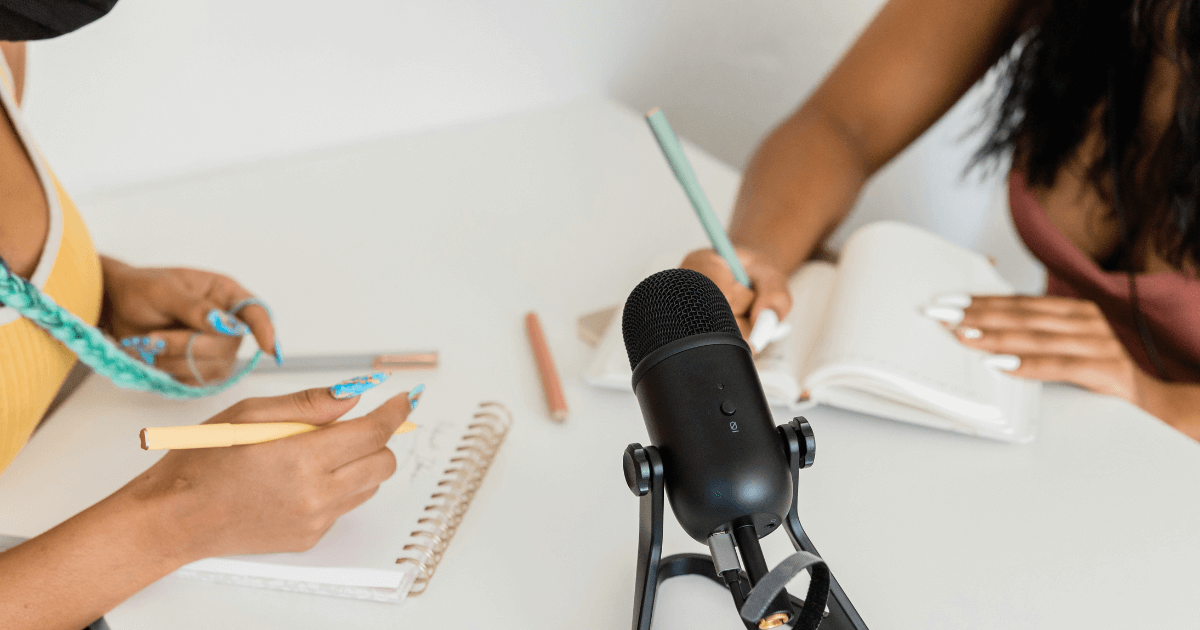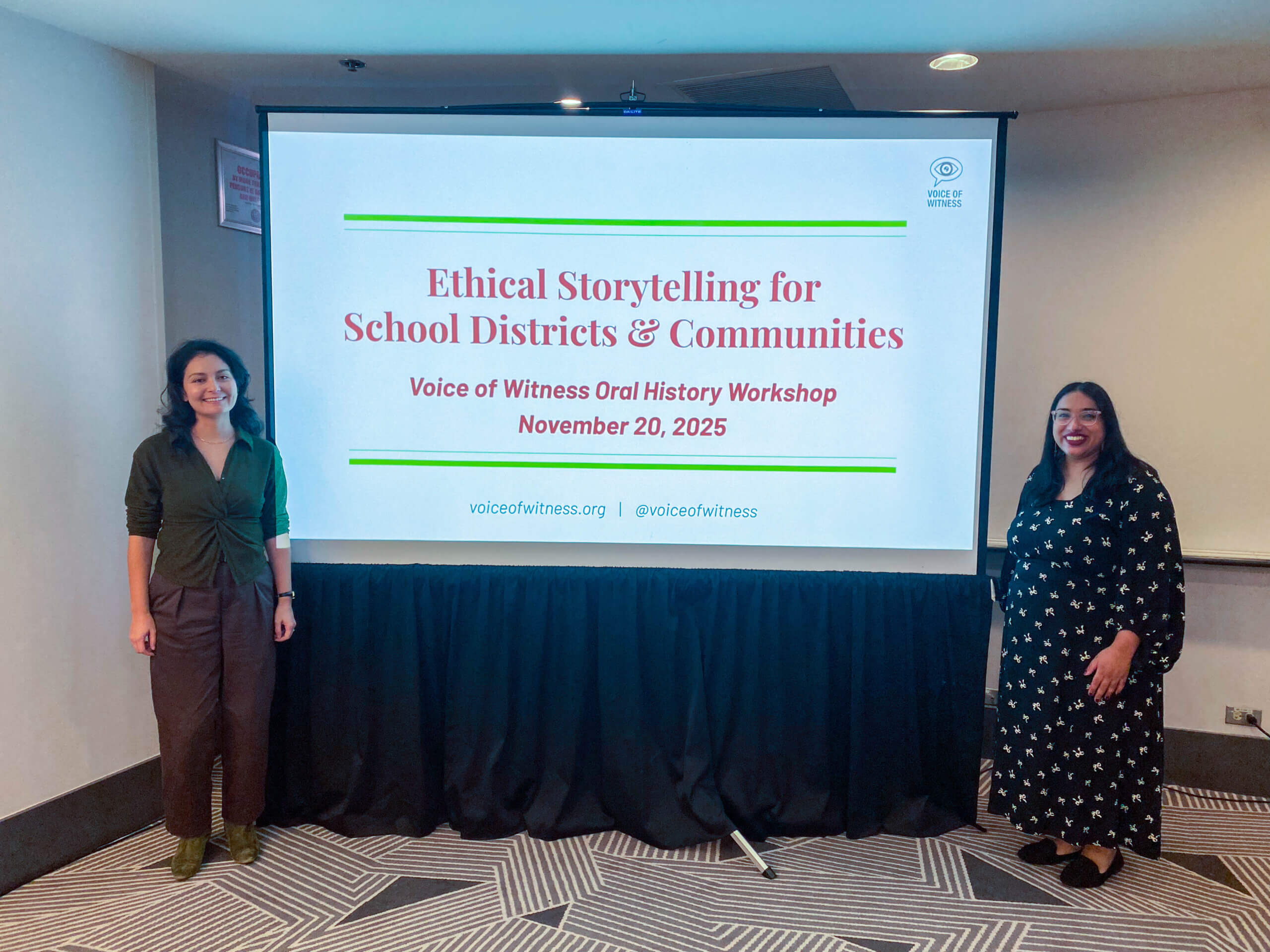
At Voice of Witness (VOW), we’re exploring a new thematic approach to our work. Selecting a theme each year, we’ll create public programming, events, and resources, share relevant stories from our archive, and collaborate with partners in the issue area to support the use of oral history and storytelling to advance justice.
Our theme for 2024-25 is Navigating Democracy: Resistance and Belonging through Storytelling.
At Voice of Witness, we are focused on building a healthy, equitable democracy by providing community-based storytelling and oral histories of resistance; supporting civic engagement and belonging; and transforming harmful narratives to support movements for justice.
Oral history is about lived experiences and the real-life human impacts of policy. These stories can help people understand complex issues, counter erasure and stereotypes, and get involved with civic processes. All of this impacts how we make sense of the world and what we imagine is possible for the future of our democracy.
In light of growing educational censorship silencing marginalized voices, misinformation, voter suppression, and other anti-democratic efforts in the US, this work is particularly vital.
Cultivating Storytelling and Oral Histories of Resistance
Documentary storytelling, reporting, and access to information are crucial to a healthy democracy, especially in the face of a collapsing media sector and near record low levels of trust in mainstream media. VOW supports first-person storytelling that illuminates systemic injustice and the day-to-day ways communities resist. The how of storytelling also matters; our trainings and resources offer insights into non-extractive, ethical practices and why they’re important.
We’re going to break the chains of oppression, of racism, of the colonialism that have chained us to this reservation, and break the feeling we can’t do anything, and we don’t matter, and that no one’s going to listen to us. I wanted to show the youth that they have a voice. Use that voice, because you have a lot of power. I tried to show them that by doing it myself.
—VOW narrator Jasilyn Charger (from How We Go Home: Voices from Indigenous North America)
VOW has been an invaluable partner and guide, helping us to empower immigrants and asylum seekers to share their stories in service of a larger social justice vision… With VOW’s training and support, community narrators have grown into project leaders and continue to serve their communities through outreach, education, organizing, and narrative change efforts.
—VOW partner East Bay Sanctuary Covenant
Supporting Civic Engagement & Advocacy
Through community partnerships, we support organizations in their civic and advocacy work by providing workshops and facilitating storytelling projects. First-person narratives offer testimony of problems that require urgent attention and can serve as powerful tools for organizations to support movement building and social change.
VOW’s education program provides students the opportunity to learn directly from individuals impacted by a particular issue—perspectives that are often left out of textbooks and mainstream curricula. Oral history inspires students to establish personal connections to local and national political issues. Students can also conduct their own oral history projects with peers, family, or community members, fostering critical thinking, belonging, and civic participation.
NEW: Lesson Plans on Democracy and Civic Engagement. This unit provides students with an accessible way to learn more about democracy through personal narrative. It gives students an opportunity to create a picture of democracy that goes beyond political parties or voting to emphasize community power, voice, and resistance and inspire them to be active participants in building a better future.
EVENT: Democracy and Civic Engagement Workshop for Educators. We hosted a workshop on democracy, civic engagement, and storytelling in the classroom on August 12th, with a special feature from NPR/PBS member station KQED about their Youth Media Challenge: Call for Change. Geared toward middle and high school educators, this session explored these topics through the lens of first-person storytelling, community voices, belonging, and resistance. Educators will leave with tools and materials ready for the classroom.
EVENT: Storytelling for Immigrant Justice. We partnered with the historic Women’s Building in San Francisco to co-host a community storytelling/listening session. The event centered around oral histories and actionable steps for solidarity amid a charged election season with rampant xenophobia and dehumanizing rhetoric from politicians and mass media.
Countering Harmful Narratives & Creating Change
Particularly in an election year, misinformation and stereotypes run rampant. Oral history makes space for stories that are not represented in mainstream media or politicians’ narratives. It creates a platform for individuals and communities that don’t feel connected to or represented by dominant narratives to share their firsthand experiences. By sharing stories in their own words, people can collectively build power and advance narrative change.
Learn about some of our ongoing initiatives:
- VOW Podcast: In partnership with Lemonada Media, we launched a podcast pilot exploring oral history as a tool for resistance and belonging. The first two episodes are out now, focused on Indigenous justice and immigrant justice.
- Migration and Community Building in Appalachia: This project shares oral histories of refugees, migrants, and generations-long residents that show how belonging and connection are created despite displacement, resource extraction, and inequality. These stories expand our ideas of who belongs and add to the growing body of works that counter damaging myths of the region and immigration.
- Partnering with East Bay Sanctuary Covenant (EBSC): We have supported EBSC, an immigrant justice organization, in storytelling efforts for campaigns related to Temporary Protected Status, sanctuary cities, climate migration, Maya Mam community members, and more.
- Upcoming Project on Homelessness: We’re collaborating on a new project that will document and center the voices of unhoused activists, amplifying stories of community-led resistance, as well as educational and advocacy materials.
- Our Voices: Democracy and Storytelling Q&A Series
- 5 Ways to Take Action Against Educational Censorship
Stay tuned on this page for more upcoming activities related to Navigating Democracy: Resistance and Belonging through Storytelling.
Interested in partnering with VOW around this issue area? Reach out to: ela@voiceofwitness.org.




